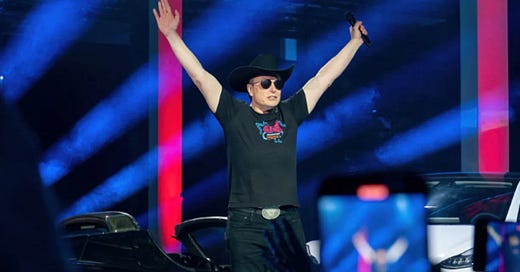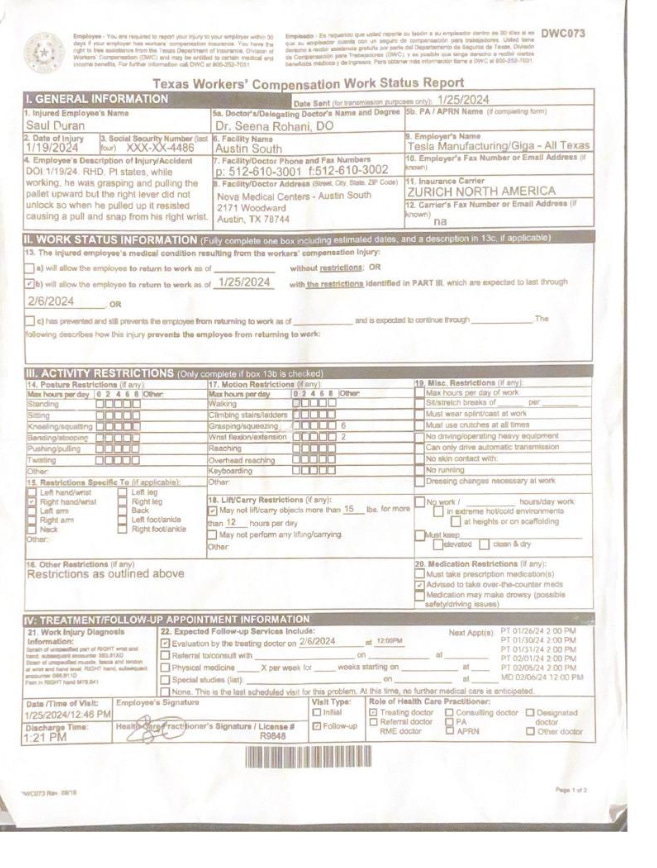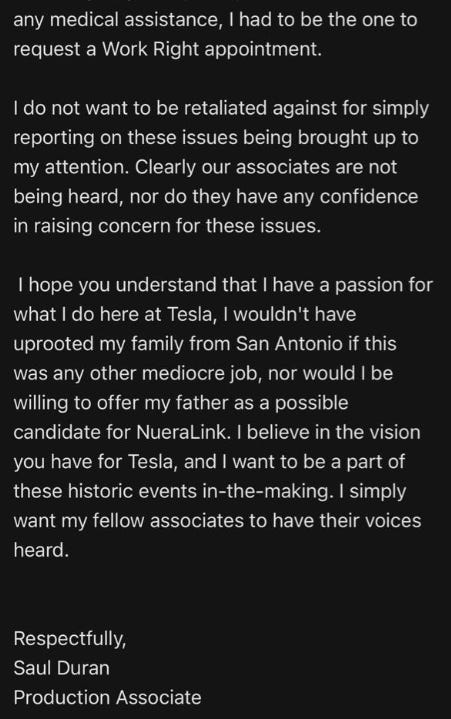Welcome to a Saturday edition of Progress Report.
This past week was an exhausting one for avid consumers of news and an extremely consequential one for anybody invested in not living in a corporate theocracy awash in bullet casings and blood.
The Supreme Court’s decisions on bump stocks (now people can again carry the equivalent of a machine gun), medicated abortion (justices only rejected the plaintiff’s standing, not the underlying issue), and worker rights (Starbucks won round one in hobbling the NLRB) are all important items to discuss. So is Clarence Thomas’s disclosure of even more jaunts on the private plane, as is the latest humiliating twist in New York Gov. Kathy Hochul’s self-inflicted congestion pricing disaster.
Those stories will be addressed, but tonight, we have an reported feature on what it’s like to work for Tesla, which had his own landmark week. It is very much worth your time.
Note: To make this work as accessible as possible, I’ve lowered the price for a paid subscription back down to Substack’s $5 minimum. If you can’t afford that right now, please email me and I’ll put you on the list for free. Every paid subscription makes it easier for me to comp one while becoming sustainable.
Texas Tesla worker alleges rampant discrimination, unjust firing
It happened nearly two months ago, but Saul Duran still doesn’t know why he was fired from his job as a production associate at Tesla’s Gigafactory in Austin.
Was it because he blew the whistle on unsafe conditions after getting injured on the factory floor? Was it retaliation for calling out racist and transphobic rhetoric from coworkers? Something to do with a drug test? The email he sent to the company’s CEO, Elon Musk, raising these issues?
Tesla fires a lot of people, often in one fell swoop, as it did in April with thousands of workers in Austin, so it has mastered the art of bloodless dismissal. In this case, the dismissal came via form email — Subject: Saul Duran Termination Notice — and offered no opportunity for follow-up. Perhaps HR felt that its most recent previous email, placing Duran on a first and final warning for three unexcused absences, was enough of an explanation.
But the warning came via email just 24 hours earlier, not nearly enough time for him to do anything worthy of the nuclear option. Moreover, Duran says that called in before each of the allegedly unexcused absence, in accordance with Tesla policy — otherwise, he probably wouldn’t have won a separate appeal and been awarded a small quarterly bonus just two days prior to that final warning. Tesla sent him that career update via form email, as well, and I’ve reviewed each of the messages, along with many other relevant documents.
By the end of Duran’s nearly year-and-half tenure at Tesla, things had veered off course and spun out of control like one of the company’s “self-driving” cars. What he initially viewed as a dream first job would ultimately prove to be a gauntlet of difficulties and disappointments, from the company’s toxic culture to injuries and alleged mistreatment by management.
Duran’s experiences are also hardly unique: Musk brazenly broke rules around Covid safety early in the pandemic; investigations have uncovered higher-than-average injury rates at Tesla’s manufacturing facilities; the NLRB has found the company guilty of illegal union-busting; and Tesla has regularly faced lawsuits by ex-employees over racial discrimination and sexual harassment. While some have been settled, others, including a class action suit from 6000 Black workers, is still ongoing.
Tesla is currently pursuing a lawsuit that aims to invalidate the structure of the NLRB’s enforcement mechanisms, banking on the federal judiciary’s new hostility to regulatory bodies.
This past week alone offered a clear window into life for workers at the company.
On Tuesday, a story in the Wall Street Journal revealed that Musk has repeatedly pursued and harassed female employees at SpaceX and Tesla. On Wednesday, Musk was sued by former employees who allege that he ordered their firings after they spoke out about SpaceX’s tolerance of sexual harassment. On Thursday, it was Tesla investors suing him over allegations that he diverted resources from the company to an AI venture. And at the end of the week, Musk announced that he’d convinced a majority of shareholders to approve a $45 billion payday that has been put on pause by a judge in Delaware.
The larger list of alleged offenses is long and detailed enough to make a casual reader’s eyes glaze over. To process the allegations, it’s helpful to view them from the ground level. Since 2022, I’ve spent a fair amount of time talking with workers who have worked for and later sued Tesla; in some cases, they have been vindicated by judges’ decisions and awarded millions of dollars in damages. Duran’s allegations are in line with the testimonies of other Tesla workers, flecked with his own specific horrors.
In hindsight, the first red flag appeared during his first week on the job. Duran recalls the manager leading new employee orientation telling that workers at the Gigafactory didn’t need a labor union because they were given stock options in the company.
“They were essentially stating that if some of you guys are pro-union, that's great, but if Tesla ever went union, you will lose all your stock options,” Duran alleges. “They also made it a point to bring up the fact that unions are essentially a waste of time and money because they’re able to fire people just because they decide to, because they’re an at-will employer.”
Musk, who has been vocally anti-union, suggested something similar in 2018, when he tweeted that if Tesla’s employees unionized, they would lose out on their company stock options. In 2021, the NLRB found that the tweet was tantamount to illegal intimidation, a ruling affirmed by a three-judge panel from the 5th Circuit Court of Appeals. The entire 5th Circuit reheard the case in January.
Systemic dysfunction plagued the Gigafactory, Duran says, and it was exacerbated by a toxic culture that pervaded what he alleges were understaffed production lines and unresponsive management. Early on, he alleges, coworkers began mocking a trans coworker who had also recently began working at the company.
“I overheard one of them saying, ‘Oh my God, I don't want that fag–t around me because I don't want to get AIDS,’” Duran, who is gay, remembers. “I looked at him and I was like, ‘please don't say those things, they’re very offensive. She wasn’t doing anything to you. She works harder than all of you guys.”
This was hardly an isolated incident. Duran recalls a Black co-worker being castigated for not wearing makeup or brushing her hair before a shift, which another co-worker on the line referred to as her “civil rights hair.” Punishments for making such remarks were sparing, while at least one participant received a promotion, Duran says.
“I understand that it’s the South,” says Duran, a lifelong Texan, “but I was just shocked at how pervasive it was.”
For much of his first year at the Gigafactory, Duran says, he was encouraged to apply for a leadership position, which was originally limited to people with at least one year of experience. When the opportunity was finally made available, his grandfather’s funeral conflicted with the interview that had been scheduled by management.
Though Duran says he flagged the crossover and told management that he had to prioritize the funeral, he says that his supervisor took it personally and promised him that he wouldn’t advance at the company.
Not that it mattered all that much to him at the time — soon after his grandfather died, Duran’s uncle took his own life, which kept him in his hometown of San Antonio for longer than anticipated. He took five days of bereavement, then an unpaid leave, a period made all the more difficult by an injury that he’d suffered when hit by a cart on the factory floor that fall.
A Disregard for Health and Safety
Tesla is infamous for discouraging workers from reporting injuries, a vibe that Duran says he received loud and clear when his supervisor suggested that he seemed to be fine after his collision. Later he would learn that his hipbone had been jarred out of its socket during the incident, but by then it was too late to report the injury and not face pushback over how it was sustained.
The next few months were marred by a spasmodic cycle of personal difficulties, failed communication, and pain.
While Tesla regularly touts increases in the Gigafactory’s production capacity, it often comes at the expense of the safety of both the cars and workers who make them.
“They were essentially prioritizing production over quality,” Duran alleges, citing faulty harnesses and seat frames among the frequent errors. “If something wasn't working, they tried to fix it on the spot and pass it on. Because of the rate of production that they were trying to achieve, I started seeing a lot of injuries happen.”
It’s standard for factories with high-pace, physically taxing production lines to regularly rotate workers between different tasks to reduce the risk of repetitive stress injuries. I’ve reported on other electric vehicle startups that ignored that critical precaution to avoid any slowdown, frequently to the workers’ physical detriment, and Duran reports that there was a similar disregard for rotation at the Gigafactory.
Ten days after he returned from bereavement and an unpaid mental health leave of absence, Duran suffered the consequences of the lack of rotation himself, with a right wrist strain that made it impossible to work or sleep. This time, he notified his supervisor, who he says sighed and suggested that Duran was frequently reporting injuries.
“He acted annoyed, he sighed and was like ‘Really? You again?’” Duran remembers. “And I was like, ‘I've never gotten injured before, thanks for your concern, I appreciate it. But can you just make me that appointment?’”
Duran says he spent nearly that entire day, a Friday, waiting for official confirmation of an appointment at the onsite health clinic. All that came was an informal last minute notice from his supervisor that he was scheduled to see a doctor the next day. Overtime was mandated by Tesla management that weekend because the line had missed its aggressive production quota, so he dragged himself in and waited for his 10:30 AM appointment, which never happened.
When Duran confronted his supervisor, he was told it must have been some sort of oversight and that the appointment had definitely been made. His manager was scrambling, he said, and after Duran left, fed up with the situation and intent on filing a complaint with Travis County, he received an email confirming an appointment for later in the day.
By that point, however, he was on his way to see his own doctor, who told him that any chance of having Tesla pay for his treatment would require a first visit with a company doctor or third party contractor.
Days later, during an appointment at the Tesla-contracted Nova Medical Center in south Austin, Duran told the doctor about his injury and the circumstances that surrounded it. Then, Duran says, the doctor closed the door, lowered his voice, and offered his own disclosure about the company’s safety issues.
“He essentially confirmed everything,” Duran says. “He said ‘I have filed numerous complaints with the state of Texas and Travis County, because I'm seeing a lot of people — and I mean a lot of people — in the last month getting injured. Your rate of injury is extremely high.’”
Appealing to the Boss
Tesla often tells workers that Elon Musk has an open-door policy, so to speak, and that they should feel free to email him with ideas, concerns, and any other comments. The guy is very clearly online all the time, after all. Whether many people take the company up on the opportunity is hard to know, but Duran was fed up enough after months of indignities that he hit send on a long note to the world’s richest man.
After the email went unanswered — it was always a longshot — Duran began pursuing an HR complaint. Instead of being ignored, Duran says was discouraged from making the allegations at all.
“[An HR representative] made it a point to call me out and say to me that ‘I'm not sure that you know what you're talking about and you need to educate yourself on the words that you're using, because the words that you're using can have damaging effects,’” Duran recalls. “And I looked at them and I was like, ‘I hope you're not trying to educate me on what words I can use, because I know exactly what I said. And I’m saying that there's harassment, intimidation tactics, and there is racist behavior, not just from the leads, but clearly coming from you as well.”
Emails show that Duran was persistent but always exceedingly polite during his conversations with HR, which would become increasingly frustrating and cyclical. And then, in February, Duran was asked to submit to a “random” drug test, which came back positive for amphetamines — a result of his prescription for Adderall, which he flagged for HR right away with photographic proof.
Nonetheless, Duran was forced to sit at home for days on end, his ID badge deactivated, with no response from management. He was given three unexcused absences despite never being told when to return.
Tesla HR said that his record would be fixed, but that would do him little good, especially after he exposed harassment happening to other colleagues.
“It's the way that they operate,” Duran says. “If a lead gets called out, they’re going to treat you bad and retaliate against you because you got them in trouble.”
Helping to defray the costs of the funerals, missed paychecks while back in San Antonio, and three weeks of unpaid suspension over the drug test had decimated his savings, while the company’s refusal to give him the raise that most workers had received only made it harder to put any money away.
During one of the last times we spoke, in early March, his landlord served Duran and his husband a notice of eviction from their apartment.
Court proceedings led to more missed days, and though he was diligent about calling out ahead of time, as required, Duran says that following the rules did him little good. His bank account was drained, he couldn’t get the same raise as other people due to unwarranted absences on his record. Then came the final warning and termination, essentially back to back.


Some modicum of vindication arrived when the Texas Workforce Commission granted Duran unemployment benefits, indicating its belief that he was not fired for cause. But it is largely cold comfort; Duran and his husband had to move back to San Antonio, and he’s now preparing to join the Navy so that he can get the sort of technical training that he’d hoped to obtain while working at Tesla.
Wait, Before You Leave!
Progress Report has raised over $7 million dollars for progressive candidates and causes, breaks national stories about corrupt politicians, and delivers incisive analysis, and goes deep into the grassroots.
None of the money we’ve raised for candidates and causes goes to producing this newsletter or all of the related projects we put out. In fact, it costs me money to do this. So, I need your help.
For just $5 a month, you can buy a premium subscription that includes:
Premium member-only newsletters with original reporting
Financing new projects and paying new reporters
Access to upcoming chats and live notes
You can also make a one-time donation to Progress Report’s GoFundMe campaign — doing so will earn you a shout-out in the next weekend edition of the newsletter!









